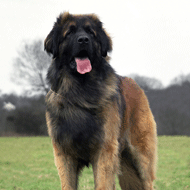
Tests to reduce risk of serious inherited neurological disorders
New DNA testing schemes have been approved for two serious inherited neurological disorders in Leonbergers.
Leonberger polyneuropathy (LPN2) is a severe neuromuscular disease characterised by progressive exercise intolerance and gait abnormalities, leading to muscle wastage in the hind limbs and sometimes breathing problems.
The disease, which is juvenile-onset, is caused by a degradation of the insulation around nerve fibres.
Scientists previously identified LPN1, another genetic region that is a major risk factor for Leonberger polyneuropathy. The presence of these genetic variants suggest the affected dog is likely to suffer from polyneuropathy - however, their absence does not necessarily mean the dog will not be affected. It is thought there are further undiscovered genetic variants that influence the onset of this disease.
Nonetheless, the tests can aid breeders in reducing the risk of the disease being passed down to puppies.
The Kennel Club also approved a DNA test for Leukoencephalomyelopath (LEMP), a neurodegenerative disorder with similar characteristics to LPN2, including progressive gait abnormalities and lack of co-ordination, as well as abnormal limb movements. It is caused by changes to the ‘white matter’ of the central nervous system.
Owing to the increasing immobility and lack of treatment associated with this disease, quality of life for both dogs and owners is reduced.
Research shows that all dogs with a confirmed LEMP diagnosis had two copies of the relevant genetic mutation. However, not all dogs with two copies were affected, suggesting there may be another influence.
Image © Diane Pearce/Kennel Club



 The Veterinary Medicines Directorate (VMD) is inviting applications from veterinary students to attend a one-week extramural studies (EMS) placement in July 2026.
The Veterinary Medicines Directorate (VMD) is inviting applications from veterinary students to attend a one-week extramural studies (EMS) placement in July 2026.